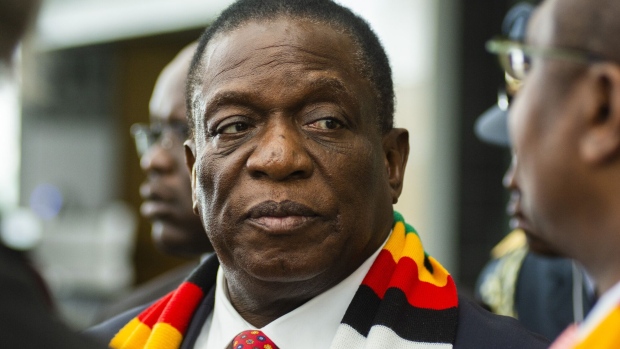Jul 5, 2024
Zimbabwe May Adopt ZiG as Sole Currency Before 2030, President Says
, Bloomberg News

(Bloomberg) -- Zimbabwean President Emmerson Mnangagwa hinted that the nation’s new bullion-backed currency will be the sole legal tender before a 2030 deadline to end the current multicurrency system.
The change would mean that US dollars, now used in more than 80% of transactions, would no longer be allowed. Last October, Mnangagwa extended dollar use by five years until 2030, in a move meant to allay growing concerns about the looming currency policy changes.
Speaking at an event on Thursday in the border city of Mutare, where he officiated over the commissioning of a fruit juice and water processing plant, Mnangagwa stressed the importance of the ZiG, short for Zimbabwe Gold, replacing US dollars.
“In two years’ time — in fact, two years is too far — we will get to the point where when I see that the ZiG is available in every part of the country,” Mnangagwa said. “We are getting to there. When you go to the shops carrying US dollars, they will refuse to accept them.”
Sign up here for the twice-weekly Next Africa newsletter
The ZiG is the nation’s sixth attempt in 15 years to have a functioning local currency. Launched in early April, it’s backed by 2.5 tons of gold and $100 million in foreign-currency reserves held by the central bank.
The ZiG was trading Friday at 13.69 per US dollar, reversing its biggest single-day decline of O.5% a day before, according to data posted on the central bank website. Central bank officials rejected the need to intervene in support of the currency, saying they expect it to strengthen against the greenback.
A collapse of the defunct Zimbabwe dollar helped drive demand for US dollars as citizens fled exchange-rate volatility in favor of hard currency. The southern African nation uses greenbacks to pay for day-to-day transactions including food, medicines and fuel.
In June 2019, Zimbabwe scrapped use of the greenback to prop up the Zimbabwe dollar, which it had just brought back into circulation after 10 years. The ban on US dollars was lifted at the start of the coronavirus pandemic in March 2020 to help ease an acute shortage of foreign-exchange.
You can follow Bloomberg’s reporting on Africa on WhatsApp. Sign up here.
(Updates with latest currency movements from in sixth paragraph)
©2024 Bloomberg L.P.





